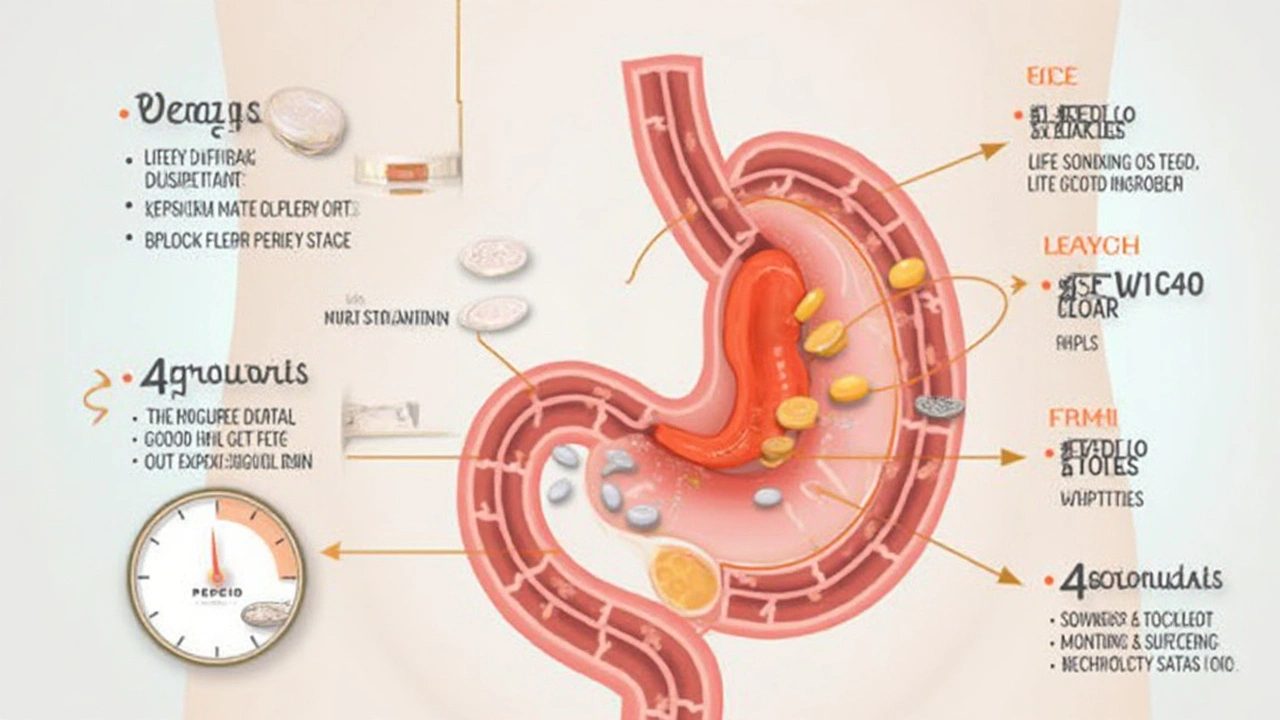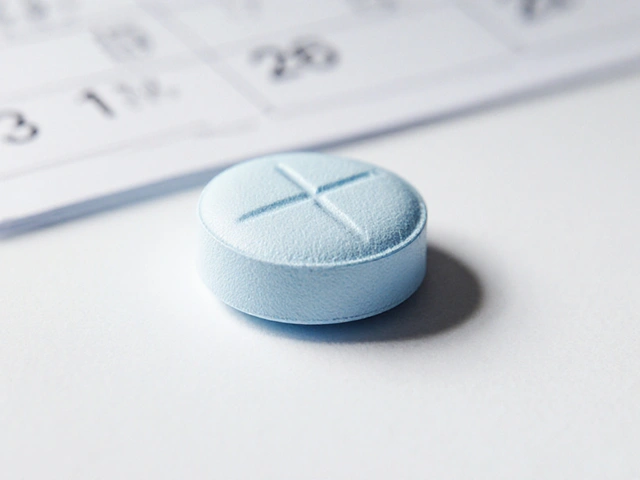Imagine finishing a spicy burger and feeling that burning pain crawl up your chest. You reach into your bag and pull out something millions lean on: Pepcid. But ever wonder what makes this little pill so powerful against that fiery discomfort? It sits quietly on pharmacy shelves, but in reality, Pepcid has a story that's anything but boring.
What Exactly Is Pepcid and How Does It Work?
Pepcid is the brand name for famotidine—a type of drug known as an H2 blocker. It’s been around since the late 1980s and quickly overtook older meds like cimetidine and ranitidine because it did the job just as well, without some of their messier side effects. Here’s the down-to-earth explanation: when you eat, your stomach cells crank out acid to help digest food. Sometimes, your body goes a bit overboard. Want to guess what happens when too much acid splashes up your esophagus? That telltale burn—acid reflux or heartburn.
Pepcid works by blocking histamine H2 receptors found in the stomach lining. Histamine normally tells your stomach to make more acid, so blocking this instruction is like turning off a faucet. Less acid means less pain and damage. Compared to antacids, which neutralize acid you’ve already made, Pepcid stops your stomach from pumping out so much in the first place. The result: fewer flames, less discomfort after those pizza slices.
Let’s talk about the numbers for a sec. Studies show Pepcid starts working in about 30 to 60 minutes. You can expect relief that lasts up to 12 hours, making it handy for that chili you regret eating or that late-night dinner. Hospitals frequently give famotidine to patients at risk of ulcers or stress gastritis—not just for heartburn warriors at home.
Pepcid is available in several forms: tablets, chewables, and as a liquid. You can find it over the counter at doses like 10 mg or 20 mg, while doctors might prescribe higher doses for more serious cases. The medical field didn’t design it only for heartburn—Pepcid is also used to treat and prevent ulcers, relieve sour stomach, and even manage some allergic reactions if combined with other meds.
Let’s bust a legend here: Pepcid isn’t just for grown-ups. Pediatricians sometimes use it for babies and kids—with careful dosing, of course—especially in cases of reflux or gastritis. It’s not the wild west though; always check with a pediatrician before giving any to your child.
One thing that caught the public’s eye: Pepcid is now the go-to H2 blocker after concerns about ranitidine (Zantac) being pulled due to possible contamination with a chemical called NDMA, which could be a cancer risk if taken long-term. Famotidine (the active ingredient in Pepcid) has consistently tested clean, making it a safer bet in this category.
Bottom line: Pepcid is a simple, trusted way to turn down the acid and nix the burn, but like any med, it works best when you understand what it can (and can’t) do.
| Brand Name | Generic Name | Half-Life | Relief Duration | Onset of Relief | OTC Strengths |
|---|---|---|---|---|---|
| Pepcid | Famotidine | 2.5-3.5 hours | Up to 12 hours | 30-60 minutes | 10 mg, 20 mg |

When Should You Use Pepcid? Tips and Real-Life Scenarios
So, when should you reach for Pepcid? Classic situation: you know heartburn is about to crash your night. Maybe you’re going out for spicy Indian food, or you just like the tang of a good tomato sauce. That’s when you can take it preemptively—usually 15-60 minutes before eating or drinking something that tempts fate. Taking Pepcid before a trigger meal can sometimes prevent symptoms from ever starting. Most folks pop it after symptoms hit, which is totally fine, too. Either way, the relief is on the way.
Here’s a real-world tip: if you end up using Pepcid regularly (say, most days), it’s smart to ask your doctor about your symptoms. Ongoing heartburn might need a closer look. Sometimes chronic acid reflux can trigger something called GERD (gastroesophageal reflux disease). Left unchecked, that can cause throat problems, swallowing trouble, and even increase the risk of cancer years down the line. So listen to your body—if you’re on the Pepcid train every day, your doctor should know.
Pepcid has some neat off-label uses, too. In recent years, some hospitals even used famotidine in COVID-19 protocols, after some early data hinted it “might” help reduce certain symptoms. The results were mixed, but it shows how versatile this drug is in a pinch. Athletes with exercise-induced heartburn (yes, think runners with a burning chest after a marathon) sometimes use it to cope.
Ever wondered if you can combine Pepcid with other stuff? You usually can, but you want to be smart about it. For example, both antacids and Pepcid can be useful, but timing matters. Take Pepcid first, then wait 30-60 minutes before using an antacid—this avoids the antacid masking how well the medicine works. Another big point: medicines that need acid to be absorbed, like some antifungal pills or certain HIV meds, may not work well if you take Pepcid. Always, always ask a pharmacist if you’re mixing meds—better safe than sorry.
There’s a lot of debate about whether to go for Pepcid or something like omeprazole (Prilosec), which is a PPI. The main difference is that Pepcid gives quicker relief but doesn’t last as long. PPIs take a day or two to really kick in but manage acid production for longer stretches. If you want a quick fix for a rare spicy meal, Pepcid is your friend. If your heartburn is every day and keeps you up at night, talk to your doctor—a PPI might be in the cards.
Here’s a pro tip: alcohol and peppermint are sneaky heartburn triggers that not everyone realizes. If you notice heartburn flaring up after that mojito or breath-freshening gum, it might not be random. Keeping a diary of your meals, drinks, and symptoms can help spot your personal triggers—then you use Pepcid only when you really need to.
Travelers love Pepcid because hotel meals and unpredictable food can mess with your system. Keep a couple of tablets in your suitcase for surprise heartburn on the plane—or after sampling street food abroad.
Don't forget, Pepcid isn’t instant magic. While it works faster than a lot of other acid reducers, it still takes a little time. If you want relief right this second, a chewable antacid is the usual go-to. For everything else, Pepcid’s lower-maintenance approach fits right into a busy life.
- Take Pepcid with a full glass of water—this helps the medicine get absorbed and go to work.
- For best results before a meal, time your dose about a half-hour before eating.
- If you miss a dose, just take it when you remember—don’t double up later.
- If you need it more than two weeks at a time, chat with your doctor to rule out more serious causes.
- If you're pregnant or breastfeeding, good news: Pepcid is considered safe for most women, but double-check with your health provider anyway.

Potential Side Effects, Myths, and How to Use Pepcid Wisely
No medicine is perfect, Pepcid included. Most people don’t have any side effects, and if they do, they’re usually mild—think headache, dizziness, or mild tummy cramps. In really rare cases, people get confused, especially older adults or those with kidney problems, but that’s more likely on seriously high doses.
Long-term use is usually safe, but there are some things you should keep in mind. Because Pepcid reduces acid, using it nonstop could mess with your stomach’s ability to absorb vitamin B12 or certain minerals (like calcium or magnesium). But these issues are much less common with Pepcid than the newer group of meds called PPIs. If you’re popping a pill every day, you might want to ask your doctor to check your vitamin levels every once in a while, just in case.
Let’s knock out a myth or two. Contrary to a lot of rumors, Pepcid does NOT instantly cure heartburn. It eases symptoms and prevents future flare-ups, but if you have sudden severe chest pain, trouble breathing, or you’re sweating buckets, don’t grab Pepcid—call for help, because this could be a heart issue.
Also, a lot of people think more is better, but taking extra tablets isn’t going to make the relief come any quicker or stronger. Stick to the dose on the box or your doctor’s instructions. Overdoing it just raises your chance of side effects with zero added benefit.
Here’s something lots of people miss: if you have kidney troubles, you might need a lower dose. Why? Because the kidneys clear out famotidine. If they aren’t working right, the drug can build up and increase side effect risks. Always mention kidney problems to your doctor or pharmacist before using this medicine.
Don’t forget drug interactions: while rare, Pepcid can affect how some medications work. For example, it may slightly tweak blood levels of certain seizure drugs or antifungals. This is usually not a problem, but it’s something to keep in mind if you’re on several daily meds. If you’re the sort of person with a shelf full of prescription bottles, best to double-check with your pharmacist before adding Pepcid to the mix.
Here are some dos and don’ts to remember if you want to get the most out of Pepcid:
- DO keep it handy for meals you know can trigger trouble — think pizza night, curry, or heavy takeout.
- DON’T double dose if you forget your pill.
- DO talk to your doctor if you have reflux symptoms more than twice each week or if you've been using Pepcid for more than 14 days straight.
- DO check with your doctor if you're pregnant, breastfeeding, or giving it to a child.
- DON’T expect it to fix other causes of chest pain—know your signs, and see a doctor if you're worried.
The bottom line is Pepcid isn’t just a simple over-the-counter heartburn pill. It’s a versatile, well-tested, and safe tool for managing acid troubles, as long as you’re smart about how and when to use it. Knowing how Pepcid works, tips for timing your dose, and watching out for side effects puts you ahead of the game. Your stomach will thank you next time the spicy food cravings hit.




Gracee Taylor
July 17 2025I've used Pepcid a few times for heartburn, and honestly, it's been pretty reliable for me. I always wondered about the best time to take it though. Should it be before meals or right after?
Also, it’s interesting how some heartburn meds work differently for different people. I’ve heard some people say Pepcid works better for them than antacids. Anyone else have experience with that?
It'd be nice to know more about how it actually works in the stomach because that could help prevent heartburn altogether rather than just treating it.